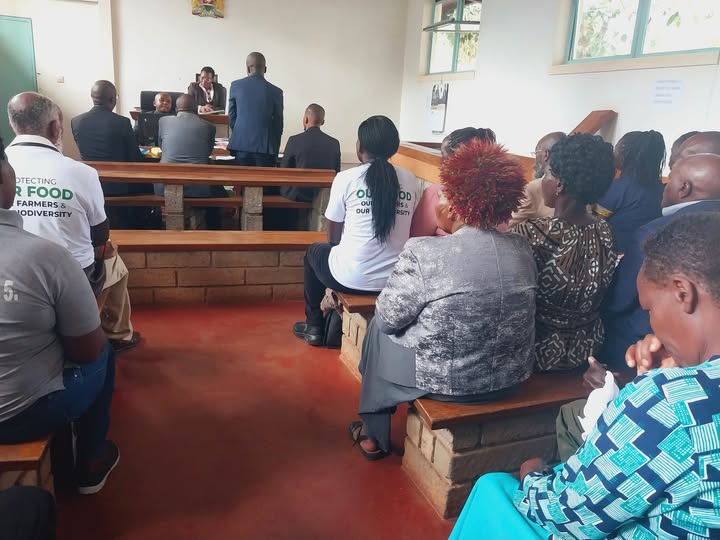
 Famers following proceedings during a hearing of their case challenging seed law at Machakos High Court in Machakos County on May 20, 2025./GEORGE OWITI
Famers following proceedings during a hearing of their case challenging seed law at Machakos High Court in Machakos County on May 20, 2025./GEORGE OWITIFifteen Kenyan smallholder farmers initiated the suit in July 2022, arguing that the restrictive seed laws undermine their traditional practices and constitutional rights.
The proceedings, held at the Machakos High Court, saw impassioned submissions from both the petitioners and interested parties, as well as the state.
During the recent hearing, Judge Rhoda Ruto announced the upcoming judgment date after carefully considering all arguments presented.
Lawyer Alvin Muhandik, representing the petitioners and Greenpeace Africa, emphasized the profound impact the case's outcome would have on local farmers.
"My lord, before you are local farmers from various parts of the country who... are against the provisions of the Seed and Plant Varieties Act Cap 326 which they claim or allege that contravenes provisions of the Constitution, their rights under the Constitution and what we call the farmer rights which have been drawn from international instruments which are applicable to Kenya pursuant to Article 254 of the Constitution of Kenya," Muhandik stated.
Muhandik further argued that the contested law, by allowing an international convention aimed at commercialising the seed sector, effectively bars many local farmers from using their farm-saved and indigenous seeds.
He highlighted the long-standing cultural practice of seed exchange among farmers, asserting that any law limiting this cultural right is unconstitutional.
"It’s a cultural practice that started since time immemorial, and the Constitution of Kenya specifically provides that you can’t limit the right to culture," Muhandik asserted, also stressing the need to protect farmers' indigenous knowledge.
"These farmers have practiced and understood their seeds. They know how they adopt their community and area... and for the Act to take that away is unconstitutional."
The Law Society of Kenya (LSK), admitted as an interested party in July 2024, echoed these concerns.
Lawyer Wambugu Wanjohi, representing the LSK, told the court that the Seed and Plant Variety Act of 2012 and the Seed Regulations of 2016 are discriminatory towards smallholder farmers.
"Our submission is that the Seed and Plant Variety Act of 2012 and the Seed Regulations of 2016 discriminate against smallholder farmers. These particular provisions of the law make it illegal for smallholder farmers to share and save seeds for next harvests and require that farmers register for seeds in a seed index," Wanjohi submitted.
Conversely, Samuel Wahome, the lawyer representing the respondents (KEPHIS and the Attorney General), questioned the timing of the petitioners' challenge, urging the court to dismiss the case.
He claimed that the plaintiffs and interested parties were selectively interpreting constitutional articles to support their arguments.
Despite the state's opposition, the petitioners, supported by organizations like Greenpeace Africa and BIBA Kenya, view this litigation as a pivotal moment for food sovereignty, biodiversity, and the livelihoods of smallholder farmers in Kenya and beyond.
They are advocating for the legal recognition and protection of Farmer Managed Seed Systems (FMSS) and the restoration of their fundamental rights.
"As far as this case is concerned, our submissions are powerful. We have given conclusive evidence that our seeds rights are being violated," said Justus Mololo, National Chairman of the Kenya Small Scale Farmers Forum, expressing confidence in a favorable outcome.
Beatrice Mwangi, a farmer from Nakuru County, added, "As farmers, we are confident we will win the case since we are the seed owners hence have the right to agitate for our seeds."
Elizabeth Opollo, a food campaigner for Greenpeace Africa, underlined the broader implications: "We care about the case because this is about the food we eat, biodiversity, and farmers’ rights."
"It’s high time we ensure the government supports farmers, protects our biodiversity. Agroecology is one of the ways we can ensure that our food systems are resilient."
Daniel Wanjama, coordinator of the Seed Savers Network, highlighted the current state of seed access in Kenya, noting that vegetable seed imports have surged to over 95 per cent.
"That means local people or companies aren’t able to supply seeds because of the laws we have. Kenyans rely on seeds which aren’t certified," Wanjama explained.
He emphasized the critical role of farmer-saved seeds, stating that 80 per cent of seeds used by farmers are from their own reserves, making any criminalization of seed saving a threat to food security.
"Criminalizing seed saving, farmers’ seeds, means hunger," he warned.














